

Android phone users have been warned to keep a close eye on the protection of the data on their devices after it was revealed that hardly any phones featuring the software have encryption included.
According to the Wall Street Journal, only two percent of Android phones have encryption, compared to nearly 95 percent of Apple’s iPhones
This could mean that users are having their private data and personal information snooped on by outside forces, such as government or law enforcement organisations.
An unexpected downside to the huge popularity of Android devices, the sheer fragmentation of the software across millions of devices means that it was previously difficult for Google to include data encryption.
In fact, the company only introduced the protection with the latest version of Android, 6.0 Marshmallow, where it began included full-disk encryption on the newest devices, meaning that the vast majority of Android devices lack proper protection.
Google also gives away its Android software to attract more users to its services, as although the company requires customers to include the Android brand and key Google services such as search and maps, the device makers are ultimately free to use the software as they wish.
This is in significant contrast to Apple, which builds all the software and hardware for its mobile devices, and constantly prompts users to upgrade to the latest version of iOS, meaning all its devices rapidly become equipped with encryption.
This stance has become extremely pertinent in recent weeks, as Apple has been engaged in a struggle with the FBI regarding the unlocking of the iPhone belonging to one of the San Bernardino terrorists, Syed Rizwan Farook.
Apple has refused to co-operate over the matter, and said that the move violates its constitutional rights and that law enforcement authorities are seeking “dangerous powers”.
Can you protect your privacy online? Take our quiz!
More bad news for Google. Second time in less than a year that some part…
Federal office that tackled misinformation and disinformation from hostile nations is closed down, after criticism…
After Nvidia admits it will take $5.5 billion charge as Trump export limits of slower…
Trump continues to target his former CISA head, signing a new executive order targetting Chris…
Two Chinese retailers warn customers in America that prices will increase next week, as Trump's…
Engineer Cristina Balan wins latest round in her long-running defamation claim against Elon Musk's EV…
View Comments
The majority of smartphone users probably don't need encryption anyway, in the sense that what's on their phone is of little value - so it might not be that big an issue.
Perhaps of more concern is the unwanted malware, viruses etc., but thats not really an encryption issue.